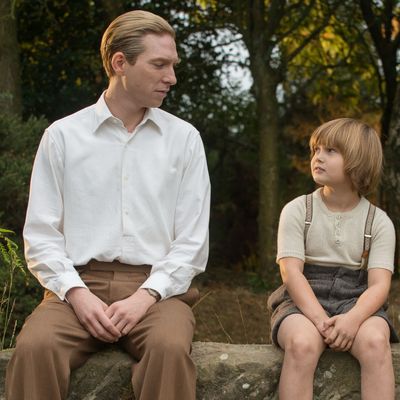
There might be a terrific movie in the life of Christopher Robin Milne, whose fantasy play with his father, Alan Alexander (“A.A.”), and a collection of stuffed animals became the basis of the Winnie-the-Pooh books he would later claim robbed him of his childhood and thrust him into a limelight he loathed. The story is an amazing illustration of the essential anti-humanism of modern celebrity, which generally smothers what it means to exalt.
You can discern the outlines of that better movie in the decent but overripe Goodbye Christopher Robin amid warmly saturated frames that turn East Sussex’s Ashdown Forest into a Magical Land of Enchanting Wonderfulness through which the 8-year-old Christopher and his father frolic. Said colorful fairy-tale kingdom isn’t presented entirely without irony. It’s meant as a counterpoint to A.A.’s wrenching flashbacks of the 1916 Battle of Somme, where a million of his fellow soldiers were killed. It’s what Milne wishes the world would be, and what he sees in the company of his son. The film is framed by tragedy: It opens with a telegram Milne receives in 1941 with bad news about his son, who’s off fighting the Germans. But despite the bitter dissonances, those forest scenes with their nonstop music are so damn magical-wonderful that if you aren’t feeling the wonderfulness, you’re pretty well shut out — and the non-wonderful scenes are nearly as ham-handed. Everything in this too-too movie feels overfermented, off.
The chief mistake by screenwriters Frank Cottrell Boyce and Simon Vaughan was to tell their story not through the eyes of Christopher Robin (or “Billy Moon,” as he wanted to be called) but A.A., a dull character played with unusual inexpressiveness by Domhnall Gleeson. Apart from some energetic exchanges with the illustrator Ernest H. Shepard (Stephen Campbell Moore) — another ravaged vet — while translating Pooh and friends to the page, he’s a passive fellow, battered by circumstance as well as by his shallow, fame-hungry wife, Daphne (Margot Robbie in a performance I imagine she’ll want to forget).
A.A. was bent on becoming famous as a poet and playwright and handles the success of Pooh and friends churlishly. I found myself wanting to speak up for that bear, a well-meaning simpleton who acts on his appetites but is kind to everyone, even the insufferably depressive Eeyore. Watching Goodbye Christopher Robin, you might conclude that Pooh and his friends in the Hundred Acre Wood had no intrinsic value whatsoever and were of interest only to obnoxious children and their more obnoxious mothers, as well as journalists who clamor for interviews with a boy who insists he has nothing to do with that Christopher Robin.
The film provides a handy scold in the form of Billy Moon’s nanny, Olive, played by Kelly Macdonald with all traces of her heathery charm expunged. Belittled from the outset by Robbie’s Daphne, Olive snatches the boy away from reporters and serves as a loving parent when the Milnes are gallivanting around promoting Winnie-the-Pooh Inc. There’s an affecting scene when Billy Moon joyously takes a New Year’s call from his dad in New York — and is crushed when he realizes that the whole conversation has been broadcast live across America, where everyone wants to know the current status of Christopher Robin. Olive shares in Billy Moon’s grief and gives him something approaching unconditional love. You wait for the anvil to fall and Olive to be ripped from the boy’s life.
Recounting the plot of Goodbye Christopher Robin, I’m struck again by the marvelous ironies in the story. It needed a tougher director than Simon Curtis, who gravitates to fascinating material (My Week With Marilyn, Woman in Gold) only to bring out its banality. Another problem is the Christopher. Will Tilston, the boy who plays him at age 8, is not a bad actor, but his cherub face makes him resemble the young Geena Davis, and his Prince Valiant hair is remarkably silly — surpassing the real Christopher Robin’s by a wide margin. His girlishness is meant to be an aspect of the character, but here it’s what you register most. When he suddenly becomes Alex Lawther, who plays Christopher at age 18, it’s a non sequitur. This acid, angry teen has no relation to the wounded lad we’ve spent the movie watching. We’ve missed the transformation, the epiphany, the dramatic center of Goodbye Christopher Robin. This is quite a story, but to make it great you have to rewrite it, recast it, and redirect it in your head. And by the way, Pooh lives!


